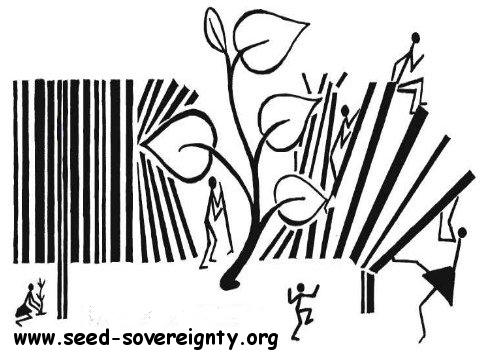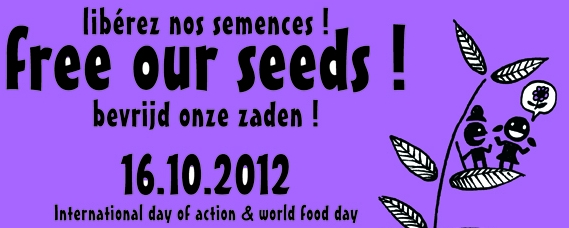
Campaign for Seed-Sovereignty
Seeds must remain part of the Commons!
![]() Evropski
poslanci kritizirajo predlagano novo zakonodajo EU o semenih
Evropski
poslanci kritizirajo predlagano novo zakonodajo EU o semenih
Kampanja
za semensko neodvisnost je zaznala kritiko predlagane
uredbe EU o semenih,
ki so jo izrazili nekateri poslanci v kmetijskem odboru Parlamenta
EU.
Na svojem sestanku
v ponedeljek, 30. septembera
so Martin Häusling (Zeleni / EFA, Nemčija), Ulrike
RODUST (S&D [socialni demokrati], Nemčija), Britta
Reimers (ALDE, Nemčija) in Karin KADENBACH (S&D,
Avstrija) v svojih nagovorih kritizirali krepitev koncentracije na
trgu semen in velikega števila delegiranih aktov. Zahtevali
so deregulacijo malih proizvajalcev in preglednost načinov
vzreje .
John Stuart Agnew (EFD, UK) je poudaril potrebo po
izključitvi fizičnih oseb iz področja uporabe
uredbe. Marc Tarabella (SD, Belgija) je predlagala ureditev, ki
omogoča brezplačno izmenjavo semen med kmeti. Georg Lyon
(ALDE , UK) je vprašal ali nova uredba resnično pomeni
poenostavitev.
Read
more
Močni
pomisleki glede predloga
Ni
edino trgovanje s semeni pod drobnogledom evropskega semenskega
pravnega reda, temveč je potencialno vključeno tudi
področje proizvodnje semen. Posledica takšnega
koncepta bi bila, da bi bili kmetije in vrtičkarji, ki
proizvajajo semena zase in za izmenjavo s svojimi sosedi dolžni v
skladu z uredbo voditi podatke o mnogih dejavnostih (odstavki 6-8
predloga). To bi pomenilo težko dodatno nepotrebno breme, zlasti
za samooskrbno kmetijstvo v vzhodni in južni Evropi. Zelo pomembno
za vse kmete je, da imajo možnost gojitve lastnih semen, brez
pravnih ovir in upravnega bremena.
Poleg tega bi uredba imala
veliko večji vpliv kot sedanje direktive. Evropska uredba ne
pušča prostora za lokalne razlage ali izvajanja, tako
da ni mogoče, da ga v državah članicah sprejmejo z
upoštevanjem posebnih zahtev njihovih kmetijskih
struktur.
V nadaljevanju lahko omenimo še, da je osnovna
težava reforme evropske zakonodaje o semenih v tem, da prednostno
obravnava zelo homogen in zelo stabilen sistem standardov (DUS -
distinctness, uniformity, stability / razločljivost,
izenačenost, stabilnost). Ti standardi so bili sprejeti za
ureditev agrokemičnih ukrepov in pogojev predelave v živilski
industriji , ki zahteva enotne pogoje za skladiščenje
in transport produktov, kar povzroča le nadaljnje
zmanjševanje biotske raznovrstnosti v evropskem kmetijstvu.
Brighton
Corn Exchange
February 3, 10 a.m. - 4 p.m.
Web
– Twitter
Recaim
the Seeds Meeting (NL)
March 2-3
by
A Seed NL et. al.
Den
Bosch, Netherlands
Bonn
(D)
9. März 2013, 11-17 Uhr
Saatgut ist Kulturgut: Festival des Vereins zur Erhaltung der Nutzpflanzenvielfalt
Thurauen
(CH)
23./24. März 2013
Internationale Saatgut-Tauschbörse von Longo Mai und Pro Specie Rara
Peliti
International Seed Festival (HE)
May
11 - 13
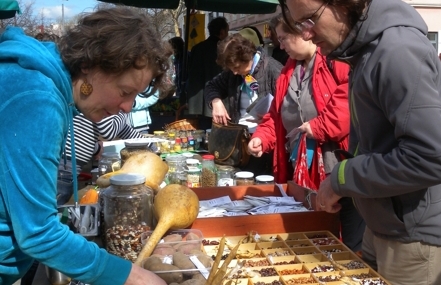
Ogrožena
raznovrstnost semen - –
proti
uredbi EU o semenih v korist semenarske industrije
Spoštovani
člani Komisije,
spoštovani člani
Parlamenta,
spoštovani člani Sveta!
Trenutno
v Bruslju pripravljajo osnutek nove uredbe EU o semenih. Če
se bodo načrti Generalnega direktorata za varno hrano in
zdravje ter zaščito potrošnikov uresničili,
potem bo še več redkih in starih sort sadja, zelenjave
in žit izgnilo s tržišča. Na te pestre sorte in sorte,
prilagojene ekološkemu kmetovanju se bo zgrnila
birokracija, medtem ko se bo moč agro industrije še
naprej krepila.
Trenutno dostopni osnutki nove uredbe EU o
semenskem materialu spodbujajo koncentracijo trga s semeni v rokah
majhnega števila koncernov semenarske industrije. To je
nesprejemljivo. Nova uredba EU o semenih mora zagotavljati
pestrost sort in pogoje za ekstenzivno kmetovanje in ekološko
žlahtnjenje. Raznolike sorte morajo biti dostopne ne samo v
genskih bankah, temveč tudi na tržišču, brez
kakršnih koli birokratskih omejitev.
Zato zahtevamo:
nobene obveze registracije sort! Poleg tega je potrebno zmanjšati
sedaj veljavne kriterije registracije sort, ustreznih za ekološko
kmetovanje, v oziru njihove genske pestrosti, da naše
kmetijstvo ohrani sposobnost prilagajanja klimatskim spremembam,
novim škodljivcem in boleznim ter nenazadnje okolju
prijaznim življenjskim slogom.
Teh zahtev ne izpolnjujejo niti
obstoječi zakoni EU o rastlinskem razmnoževalnem materialu
niti trenutno dostopni neformalno predloženi osnutki spremembe
zakona. Nasprotno, le-ti ogrožajo pestrost semen in kot taki
skupno kmetijsko dediščino človeštva.
Obenem ogrožajo trajnostno naravnane prehranske sisteme in služijo
zgolj namenom agrokemične industrije.
Pozivamo vas –
člane Evropske komisije, Evropskega parlamenta in Sveta EU,
da zavrnete vsak predlog nove uredbe o rastlinskem razmnoževalnem
materialu, ki ne izpolnjuje zgoraj navedenih zahtev! Nobenega
nadaljnjega uničevanja kmetijske in hortikulturne pestrosti v
Evropi več!
Več
informacij lahko najdete na strani pobudnikov in pobudnic peticije
ter drugih:
- Kampanja za neodvisnost semen:
www.saatgutkampagne.org / www.seed-sovereignty.org/SL/index.html
- Nemška krovna organizacija za raznolikost kulturnih
rastlin in pasem živali:
www.kulturpflanzen-nutztiervielfalt.org/
-
Blog Patricka Wieba: www.bifurcatedcarrots.eu/
-
Varuhi semen, Društvo za ohranjanje biotske pestrosti
kulturnih rastlin: www.semenska.org/domov.html
Utemeljitev:
Dosedanji
pravni predpisi EU o rastlinskem razmnoževalnem materialu izvirajo
iz časa, v katerem so bili varovanje okolja, narave in
biotske raznolikosti podcenjeni. Obstajala so številna
žlahtnjiteljska podjetja, ki so trg bogatila s pestrostjo sort.
Večino teh sort je bilo mogoče po žetvi ponovno
zasajati, kar je tehnika pridelave semen skozi tisočletja
kmetijske zgodovine.
V 80 letih prejšnjega stoletja je
bilo treba poiskati dva nova pojma, za to, kar je bila poprej
splošna praksa: prvič, »pravice kmetov«,
in drugič, »tujeprašne« sorte. Do tega je
prišlo, ker se je trg s semeni izredno spremenil. Danes
deset največjih ponudnikov semen obvladuje tri četrtine
svetovnega trga s semeni in več kot polovica globalnega trga
izvira iz kemične industrije.
Večina sort je
podvržena pravnim in tehničnim omejitvam, ki spodkopavajo
ponovno zasajanje semen, ki jih hranijo pridelovalci sami. Uvedena
je bila uradna odobritev za trženje rastlinskega razmnoževalnega
materiala sort, s kriteriji prilagojenimi industrijskim sortam.
Tovrsten razvoj se je upravičevalo s produktivnostjo in
naraščanjem števila svetovnega prebivalstva.
Obsežno poročilo Organizacije za mednarodno oceno kmetijskega
znanja, znanosti in tehnologije za razvoj (IAASTD) ponazarja
nestabilnost tega pristopa.
Raznolikost kulturnih rastlin je v
veliki meri izginila s tržišča. To zadeva predvsem
pestrost neregistriranih sort – z njimi trguje tisoče
neustrašnih državljanov in državljank v Evropi brez
zahtevane registracije. Danes smo odvisni od obsežnega strokovnega
znanja teh ljudi in k tej aktivnosti bi morali spodbujati
naraščajoče število ljudi, ne le kot
ljubiteljski dejavnosti, temveč kot viru zaslužka in
preživetja.
Drugi pomemben vidik je, da se ni žlahtnilo skoraj
nobenih sort, ustreznih posebej za ekološko kmetovanje na
osnovi njihove pestrosti. Ekološko kmetijstvo potrebuje
rastline, ki so produktivne brez spodbude kemičnih sredstev.
Slednje pa je moč doseči le z velikim genskim bazenom.
Tovrstne stare sorte po veljavnih kriterijih rutinsko obravnavajo
kot neustrezne za uspešno registracijo.
Sign
up the petition!
Hello
everyone who cares about our seeds and our freedom to use,
exchange and sell them!
Take
action in the legislative process of EU-Seed regulation!
There
is urgent action needed to avoid damage by the upcoming new EU
regulation of seed marketing. The new regulation will de facto ban
old and rare varieties and farmers varieties and threaten the
exchange and selling of seeds of diversity.
DG SANCO (the
General Direction of the EU for Sanitary and Consumer affairs) has
been working on a proposal for a new regulation since years. On
Monday, the 6th of May they will present their proposal to the
conference of commissioners. They could not get a consensus of the
two other affected DGs, DG AGRI (agricultural affairs) and DG ENVI
(environmental affairs). Both opposed the last draft of the
proposal, and DG SANCO is not looking for a consensus.
The new
regulation has mainly been drafted by Isabelle Clement-Nissou, an
employee of GNIS, the French lobby of the Seed Industry. Madame
Clement-Nissou was sent as a national expert to Brussels by the
French government and is supposed to „support“ DG
SANCO. The drafts for the proposal became worse from the first to
the second draft; and it is expected that the final proposal is
going into the same direction.
Since there is no consensus
between the three DGs, the commissioners have to vote on the
proposal. If a majority of commissioners votes against the
proposal, it should be stopped. If they vote in favour, it will be
given to the EU Parliament and to the Council.
The seed
industry is pushing the legislation, because they’ve spent a
lot of money to influence the seed legislation. Furthermore, they
don't want it to be postponed after the election of a new
parliament in May 2014. They take the risk that the commissioners
vote against it – and we think: the commissioners should do
so! There is only a little chance to get a majority of
commissioners to vote against the current proposal, but we still
should try.
Each country of the EU has one commissioner in
Brussels, so we need 14 votes against the proposal. The
commissioners of DG AGRI and DG ENVI should vote against, so we
need 12 more.
Please write to the commissioner of your country
and convince him/her to vote „NO“ on the proposal of
DG SANCO on 6th of May.
The Austrian seed saving organisation
“Arche Noah” prepared a draft
letter that you could use as template,
if needed. Or write a better one!
You can find the members
of the current commission here.
Try
to make a link from his/her department to the seed issue, and try
to make clear to him/her that the proposal for a new EU seed
legislation will affect the cultural and biodiversity heritage of
your country and the freedom of farmers to use the seeds and the
varieties they want to.
NO
PROHIBITION OF SEEDS OF DIVERSITY!
Please
write to your commissioner in Brussels immediatelz.
He/she has to make a statement on the proposal from 24th of April
on, the sooner, the better. On the 6th of May, we must obtain at
least 14 objections, otherwise this proposal will become the
official proposal
In order to coordinate the action, please
tell us if you are going to approach your commissioner!
The Latest in the Battle to Reform EU Seed Laws (2013-02-24)

![]() ALERT:
Bad new EU-seed law ahead!
ALERT:
Bad new EU-seed law ahead!
The
DG SANCO (Directorate General for Health and Consumers) of the
EU-Commission is working on a revision of the EU Seed Laws,
currently a series of directives interpreted under national law,
to be replaced by a single regulation that will come into force
directly in all the 27 EU member states without local
interpretation. This would suit the needs of seed multinationals
which want uniform laws in all their markets, but would harm the
diverse structures of agriculture and the diverse use and
production of seeds. If you want to act on behalf of
seed-sovereignty, for farmers and seed-savers, you have to become
active in the coming months!
Diversity
under attack!
The
current draft of the proposed regulation, from Nov. 2012,
contains some draconian measures for farm-based production seeds,
and diversity of plant varieties. Farmers as seed producers would
be subject to the same obligations of registration and regulation
as multinational seed company operators. Varieties of
diversity and old varieties would be endangered, and the
free exchange of seeds and other propagation material could
effectively be forbidden. If varieties have to be registered and
to pass extensive testing, this would put up unreasonably high
barriers for farmers, consumers and the diversity in agriculture
and horticulture.
The European Seed Association, lobby
organisation of the seed multinationals, has two main aims. First
to control the niche markets and make them unattractive, and
second to register all producers of farm saved seed in order to
collect royalties from them. They are also trying to combine the
testing and evaluation for plant variety protection (PVP) and the
licensing for marketing, and to privatize the entire process. This
would hit the small companies and farmers, who would face
increasing and unreasonable testing and evaluation costs, for each
single variety of seed they wish to use.
What‘s
next?
The
current draft regulation was written by DG SANCO. Before it
becomes an official proposal of the EU-Commission, DG AGRI
(Directorate General of Agriculture and Rural Development) and the
DG ENVI (Directorate General for the Environment) have to agree to
it‘s contents. At the moment there are several points of
disagreement.
This opens a window we should use to struggle for
more diversity, for open pollinated varieties (versus ”hybrid”
varieties), and for more diverse seeds in the hands of farmers,
gardeners and seed savers.
Our demands for a new EU seed law:
•No regulation of seed exchange by seed savers and farmers!
•No mandatory registration or certification for open pollinated varieties!
“From
seed to seed” -
An educational film on the production of seeds
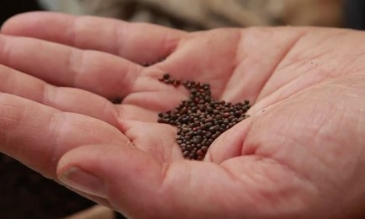 The
film is intended for all those interested in seed production -
beginners, amateur gardeners, farmers, vocational colleges,
children, those who wish to contribute to the conservation of
plant diversity, those for whom it is urgent to grow their own
seeds in order to adapt to different climate conditions or for
food security
The
film is intended for all those interested in seed production -
beginners, amateur gardeners, farmers, vocational colleges,
children, those who wish to contribute to the conservation of
plant diversity, those for whom it is urgent to grow their own
seeds in order to adapt to different climate conditions or for
food security
read
more...
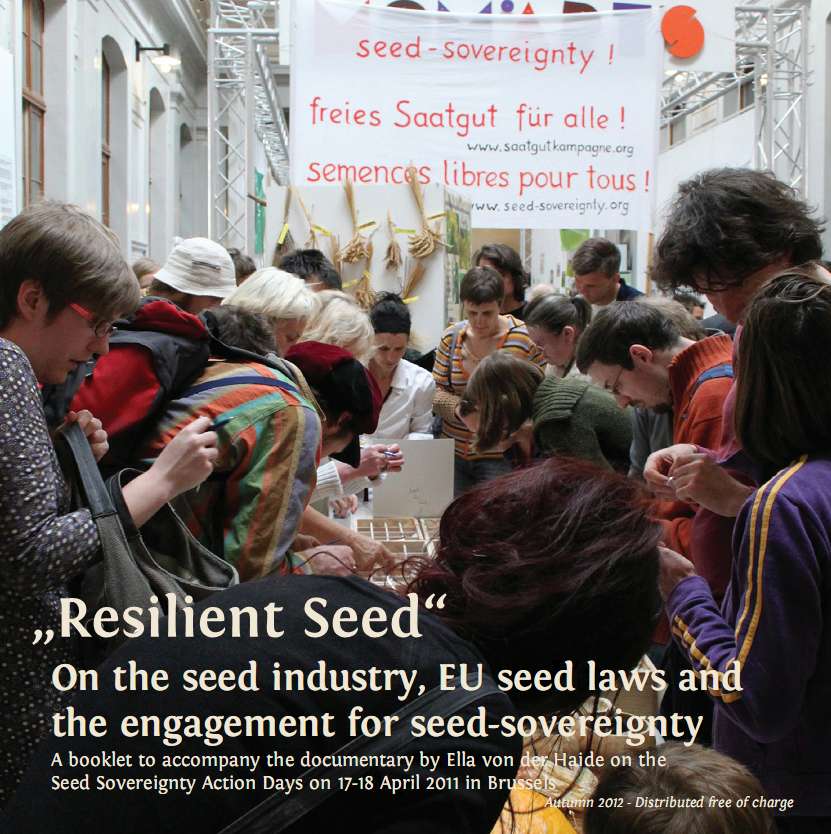 Resilient
Seed
Resilient
Seed
On the seed industry,
EU seed laws and the engagement for seed-sovereignty
„Resilient
Seed“ - the booklet
chap.
1.: Get informed and take action!
chap. 2.: The power of seed
and agrochemical companies
chap. 3.: Seed marketing law
chap.
4.; Seed law in 2012 at a crossroads
chap. 5.: Plant variety
protection (PVP) and UPOV
chap. 6.: Patents on plants
chap.
7.: How to organise a seed swap
Commission of the EU released drafts for new seed law
In
the first weeks of November the Commission of the EU has released
drafts for new
regulations
of the seed sector:
- „Draft
on plant reproductive materials”
-
„Draft
paper on plant health”
-
„Draft
paper on a proposal on official controls”
Resilient
Seed
On the seed industry,
EU seed laws and the engagement for seed-sovereignty
„Resilient
Seed“ - the booklet
chap.
1.: Get informed and take action!
chap. 2.: The power of seed
and agrochemical companies
chap. 3.: Seed law = seed marketing
law
chap. 4.; Seed law in 2012 at a crossroads
chap. 5.:
Plant variety protection (PVP) and UPOV
chap. 6.: Patents on
plants
chap. 7.: How to organise a seed swap
Call
to Action for Seed Sovereignty on 16 October 2012:
We
need seed sovereignty
to be able to
achieve food sovereignty!
Our demands are:
open access to fertile and diverse seeds free of any form of legal protection or patenting;
the right for farmers and gardeners to obtain seeds from their harvest, to re-sow, distribute and sell them;
a new model of agriculture based on local, small-scale food webs rather than monocultures requiring high inputs;
new agricultural and trade policies promoting production for local needs and not global “free” trade, dominated by transnational corporations;
policies that favour the needs of farmers and consumers, health and the environment instead of profits for big business.
The
European Court of Justice's decision reconfirms the interdiction
of seed trade:
Diversity of Cultivated Varieties
still endangered
The European Court of Justice stated the validity of current EU legislation on seed commerce by its judgement on 12th of July. Thereby it rejected the fundamental critics uttered beforehand by Advocate General Kokott. Accordingly, the existing trade embargo for seeds from non-registered varieties remains untouched. This is a defeat for the agricultural biodiversity and the ones who dedicate themselves to self-determined agriculture and gardening.
Andreas Riekeberg from the campaign for seed-sovereignty says: „It is an annoying judgement far from the reality. The court solely has reconfirmed the current EU legislation without taking into account the detailed critic by Advocate General Kokott, which pointed out the ongoing destruction of biodiversity on the fields and in the gardens driven by the respective directives. This is a slap in the face of those concerned with agricultural diversity. The judgement keeps going on promoting the seed industry and their uniform varieties which only grow with the help of chemical inputs, be it pesticides or fertilizers.“
Jürgen Holzapfel lives on the farm Ulenkrug in Mecklenburg-Vorpommern, Germany. He is a cultivator of old cereal varieties and saves his own seeds. He says: „I would have to tell the authorities about all the varieties of seeds which I save, even if I use them just for myself. To commercialize them, I would need to register them as conservation varieties, pay the fees and bear in mind not to exceed a certain quantity. I would even have to arrange with other farmers not to exceed the maximum threshold for a specific variety in a specific region. The court claims in the official press release to ensure the protection of plant genetic resources by this provision. This is just not true.“
The objectives of the campaign for seed-sovereignty are described by Anne Schweigler: „We will continue to struggle for the common right of all farmers and gardeners to decide for themselves which variety to cultivate. We will keep on organizing seed swaps and enhancing regional and international networks. The production of food and our alimentation have to be self-determined and must not be controlled by the agro-industry.“
The campaign for seed-sovereignty criticizes the policy of conserving the biodiversity stretched into a dwarfish frame by the EU directive. This in turn shall impede the emergence of a market of regional farm-saved seeds, e. g. for vegetables, cereals and seed oil as an alternative to the industrial market. Today, the European Court of Justice follows the legislative in its attempt to; „ … preventing the emergence of a parallel market for such seed, which was likely to constitute an impediment to the internal market for seed of vegetable varieties “. As written in the court's press release. It could have interfered with the business of the market-dominating corporations.
The campaign for seed-sovereignty is in line with the majority of seed saving initiatives in Europe, saying that the conservation directive is an impediment to the sustainment of biodiversity, which is luckily hardly applicable in reality. However, seed savers can be subject to prosecution when their work is disturbing the corporations.
The legal dispute between the seed saving initiative Kokopelli and the corporation Graines Beaumaux challenged the validity of current EU law and was brought to the European Court of Justice. The opinion of Advocate General Kokott on January 1st 2012 gave rise to hope that the restrictive EU directives could be dismissed.
Principally, only registered seeds may be traded within the EU. What was once meant to guarantee their quality, has evolved into a strong limitation of the diversity of seeds. Many old varieties have disappeared from the gardens and the shelves in the stores, either because they do not meet the catalogues constraints or their registration cannot be afforded by small farmers or initiatives.
Within the last 30 years a tremendous concentration on the seed market has been observed. A few transnational corporations comprise 65% to 80% of the share, depending on the crop and the region of the world. This was crucial to the accelerated destruction of biodiversity. Not until recent years (2008 - 2010), has the EU adopted three directives on conservation varieties. However, the activity of seed saving farmers and gardeners is limited due to the admission procedure and the restrictions of produced quantity.
Opinion
of the Advocate General (19.01.2012):
http://curia.europa.eu/juris/document/document.jsf?text=&docid=118143&pageIndex=0&doclang=EN&mode=req&dir=&occ=first&part=1&cid=66802
Press release of the European Court of Justice (12.07.2012): http://curia.europa.eu/jcms/jcms/P_89305/
Decision C-59/11 of the EJC: http://curia.europa.eu/juris/document/document.jsf?text=&docid=125002&pageIndex=0&doclang=EN&mode=lst&dir=&occ=first&part=1&cid=43979
(Translation of the press release of the Campaign for Seed Sovereignty from 12.07.2012)
Kampagne fü Saatgut-Souveränität (auf Deutsch, 12/072012)
Kokopelli (en Française, 12/07/2012)
